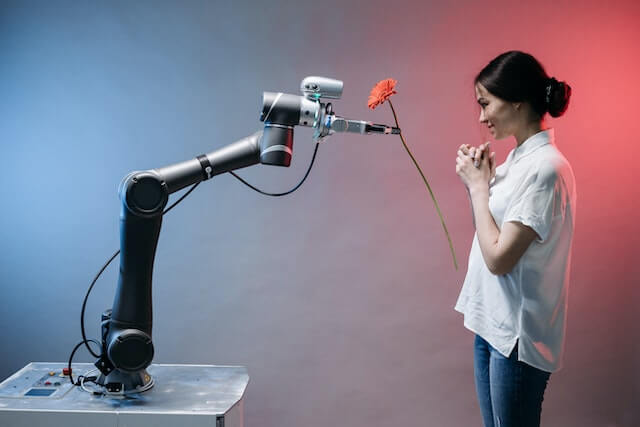
03 October 2023 - 5 min read
If you had to pick out an overriding theme of 2023 when it came to technology – the key issue that debate kept being drawn back to over the year – it would probably be artificial intelligence.
In late December 2022, artificial intelligence launched itself into the public imagination with the release of ChatGPT – an artificial intelligence-powered chatbot. Since then, we’ve seen the release of numerous others and businesses around the world have been scrambling to integrate AI products like this into their processes.
In the rush to remain competitive and to get ahead, however, have businesses overlooked some of the darker issues that are lurking beneath the surface of artificial intelligence?
Could adopting artificial intelligence help your business thrive? Or does making use of it have the potential to open your organisation up to threats and challenges?
We explore these issues and attempt to come up with a list of some of the pros and cons of AI for business below.
Let’s start with the pros.
One of the biggest capabilities of artificial intelligence is its ability to automate work – to allow a machine to take control of a process and bring speed, precision and efficiency to it in a way that a human would never be able to match.
Some commentators argue that automation is ultimately a liberating force, taking away boring, degrading and unsatisfying jobs and freeing up the people who do them to perform roles that they find more fulfilling.
According to an article by Rashi Maheshwari in Forbes, the main areas that AI looks set to automate include:
Automation, so the argument goes, means that instead of having to focus on repetitive, mechanical tasks, people will instead be able to focus on roles that require more human-skills. It could also make the workplace safer, performing roles that are dangerous, dirty or hazardous to health, or by just performing roles that people don’t really want to do.

Another key benefit of AI and automation being touted by tech experts is its ability to save employers money.
Based on historical and recent examples of technological development, it’s clear that automation of processes and job roles can help employers to cut down on labour costs – often cited by employers as one of the largest operating costs for their organisations. After all, if you have a machine that can complete a process faster than a human, why would you pay someone to do it slower?
It sounds quite dystopian to say it, but unlike employees, machines don’t need wages, generally do what they’re told and produce work of a consistent quality. They also don’t need large HR departments to manage them: perhaps a handful of engineers and technicians. As a result, employers could potentially save a lot of money in salaries and wages.
With this in mind, it’s easy to see why some employers would be attracted to significantly downsizing their workforce in order to squeeze more profit out of their enterprise.
Productivity is one of the keys to growth when it comes to business. It’s also absolutely essential when it comes to competition. Combined together, growth and competition form the backbone of the capitalist mode of production that we live under – they’re an essential component of the system and one that’s vital to how it functions.
If current productivity rates for the UK economy are anything to account for though, we currently don’t seem to be in a good place. According to the latest figures, UK productivity has remained on the same worryingly stagnant trend, with productivity rising by a mere 0.1% based on this time last year. The Financial Times cites comparisons that suggests that the US, Germany and France all produce around one sixth more than the UK in terms of hours worked.
There are a range of complex, inter-dependent reasons behind the UK’s anaemic productivity growth, ranging from the lingering impact of the 2008 Financial Crisis, austerity, Brexit and COVID-19 which divide experts. Most generally agree though that widespread investment in artificial intelligence could help to enhance productivity.
Research by Stanford and MIT has indicated that adopting artificial intelligence could improve productivity in a typical company by around 14%. In the case study, which was conducted at a call centre, it even improved productivity by around 35%.
AI could represent a way that employers can reboot flagging productivity and stay competitive internationally.

Now, it’s time to move on to the cons.
Many commentators are arguing that, at the moment at least, the conversation about artificial intelligence is mostly powered by hype.
Many suggest that current AI models are simply sophisticated predicting machines run on algorithms and not the free-thinking, cognitive beings of either your dreams/ nightmares (delete as applicable).
There’s a difference between the image that popular imagination has of artificial intelligence, and the technology that is currently taking society by storm.
Programs like ChatGPT and Bard are ‘machine learning’ programs. They are sophisticated pieces of code that create ‘actionable predictions’ based on a mind-boggling amount of calculations. They don’t really ‘think’ in the way that we see C3PO in Star Wars, Data in Star Trek or the Cylons in Battlestar Galatica as thinking.
Whilst there is the possibility that, at some point in the future, scientists and engineers may find a way to create a truly sentient machine, at the moment it remains just that – a possibility.
One of the biggest benefits of artificial intelligence is also one of its biggest negatives – it has the power to automate huge swathes of jobs.
Most people assume (somewhat naively) that automation is automatically a great thing.
Whilst many optimistic commentators are pointing out that AI will create new jobs that will replace the ones it takes, this isn’t completely the case.
AI may create new jobs, but these will, overwhelmingly, be in job fields that are completely irrelevant to ones that they take over. Research has shown that they will likely be roles that require a high degree of specialist, technical knowledge to perform, like developers, IT engineers and IT analysts. Most professionals currently working in a learning and development role, for instance, are unlikely to have the specialist skills to perform a specialist IT role.
While AI may create new jobs, they might not necessarily be the right jobs that we need to support millions of people who find that they now have no means to support themselves because of the fact that their job has been replaced by a robot.

Whilst it could help businesses to speed up their work and improve their productivity, artificial intelligence could actually put organisations at risk of lawsuits – especially with the way that the predominant type of AI that we currently have works.
At the moment, the artificial intelligence that’s making waves in society is machine-learning. This is essentially an application that uses a complex series of algorithms and mathematics to predict the ‘right’ response to any given question.
The problem with machine-learning is that a model has to be trained on existing content. At the moment, regulation doesn’t exist, so developers have been free to train their models using content on the internet – content that belongs to other people, and for which people haven’t necessarily given their consent for. Their models scrape this content, recycle it, rephrase it and adapt it for the application’s own use.
In effect, developers are using the near-limitless supply of content that the internet provides to train their models for free, despite the copyright for this ultimately belonging to other people who are not being compensated, or even asked for their permission in the first place.
This is already starting to create legal headaches for organisations who are using AI to generate content. There are even a myriad of live legal cases. It’s still unclear about where and with who the liability for content plagiarism rests.
The issue of artificial intelligence and plagiarism is a thorny one. It’s even caused strikes and industrial unrest. In the USA, the Writers Guild of America (WGA) recently went on strike in defence of its members (writers for film and television) who said that the growing use of AI in the industry is undermining quality of work, conditions and labour rights. The union recently won their demands, striking a deal that’s been hailed as a possible blueprint for other industries to follow when it comes to implementing artificial intelligence in a way that reduces negative impacts on employees.
There’s a reason why films like Terminator, The Matrix, and Blade Runner, and TV series like Battlestar Galactica never seem to leave the public zeitgeist – they address themes about runaway technology that we as a species are still struggling to find answers to.
Arguably one of humanity’s greatest strengths is our ability to adapt – after all, this is what led to our evolutionary success as a species. We adapted to our environment by making tools out of stone, and then progressively adapted these to new purposes, which led us to develop new tools out of new materials. Eventually, we’ve ended up in the modern day where our tools are incredibly sophisticated and where, potentially, we might soon have the power to create some form of artificial intelligence that is able to ‘think’ for itself.
Scientists have argued that this sentience could present a host of ethical problems and even present an existential risk to our survival as a species. Some of the risks they cite include:
There’s a famous story about Robert Oppenheimer, one of the scientists who worked on the Manhattan Project that allowed the USA to develop the world’s first atomic weapon. After watching the first devastating test detonation of the weapon that he had helped to create, Oppenheimer realised with horror the immensity of what hehad done. He found a quote from the Hindu sacred scripture the Bhagavad Gita, whirring around in his mind as he stared at the ballooning mushroom cloud: “Now I am become Death, the Destroyer of Worlds.”
Hopefully, society and businesses don't have their own ‘Oppenheimer’ moment when it comes to the development of AI.
Artificial intelligence is likely to become a key feature of our careers moving forward: whether we like it or not. How we implement the technology – and how we regulate it – are ultimately the questions that will determine how much of a positive or a negative effect it will have on our businesses and society as a whole. And at the moment, we don’t know the answers.
Develop your career with an online professional qualification that you can complete from anywhere. Download your free course guide today.